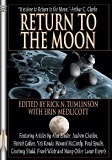FAQ #28: Should Lunar government be modeled after Antarctica?
It would be a terrible disaster for the future of mankind if the Moon was ruled by an Antarctic style regime.
The Antarctic regime was designed specifically to prevent development in order to keep Antarctica pristine for research. It was designed precisely to prevent humanity from settling in or exploiting Antarctica. That probably was the best use for Antarctica - but it's exactly the opposite of what we want for the Moon.
We very much want humanity to expand it's habitat beyond the Earth!
The Moon is clearly destined to be humanity's second home and the stepping stone to the solar system.
Antarctica is a small, unique, unneeded piece of this world. The Moon is a much larger, whole new world that has been dead for eons, but can now be brought to life by widespread human settlement.
Of course, there should be protected areas on the Moon - parks and monuments; areas of particular scientific and historical interest - and they could follow the Antarctic model.
But it would be a crime against humanity to waste the whole new world of the Moon that way.
Instead, we want the Moon to follow the pattern of Alaska - with a growing permanent population of men, women and children inhabiting cities, opening businesses, farming, mining, welcoming tourists, and setting the stage for further expansion throughout the solar system - not the pattern of permanently dead Antarctica.

Questions & Answers about Lunar Land Claims Recognition
Note: The first 25 FAQs below are reprinted from the Space Settlement Initiative ![]() website.
website.
What is the real purpose of enacting a Lunar land claims recognition law?
What does international law say about private property ownership in space?
Can there be property ownership without national sovereignty?
What if other nations refuse to recognize land claims in space?
Why not allow smaller, limited land claims for easier steps than settlement?
Could lunar land really be worth enough money to make a difference?
What conditions should the US set for recognition of a claim?
How much land should a settlement be able to claim... and why?
Are the weaknesses and compromises in this plan likely to be permanent?
Could other sources of revenue be enough without land claims recognition?
What effect would this have on NASA and the aerospace companies?
More FAQs
The FAQs above cover basic questions about Lunar Land Claims Recognition. The following questions address more advanced issues.
If we really went to the Moon in 1969, why aren't we there now?
What were the assumptions before the Outer Space Treaty, (e.g. Robert Heinlein)?
Will changing how NASA works bring the taxpayers back on board?
Could this law force the US to recognize a foreign government's Lunar land claim?
Would Article VI of the Outer Space Treaty prohibit Lunar land claims recognition?
| Back from Should Lunar Government... Antarctica? to Frequently Asked Questions (FAQs) Back from Should Lunar government... Antarctica? to the Space Settlement Institute home page |




